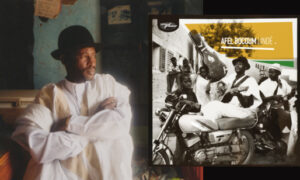Malian Songwriter and Guitarist Afel Bocoum Advocates for Social Cohesion

Malian songwriter and guitarist Afel Bocoum just released “Dakamana,” an intoxicating new single from his forthcoming studio album Lindé.
Executive produced by Damon Albarn (Blur, Gorillaz) and World Circuit’s Nick Gold, the album is due Sept. 4 via World Circuit Records.
The song offers a plea to Malians to come together at a time when jihad, poverty and tribal war have brought the country to its knees.
“Malian culture doesn’t recognize divisive expressions such as: ‘Northerner,’ ‘Southerner,’ ‘black’ and ‘white,'” says Bocoum in a press release. “Let’s just say ‘Malian,’ full stop. Social cohesion is our social security.”
In addition to the calabash and the kamele n’goni (large “youth” harp), the song also features trombone courtesy of Skatalites veteran Vin Gordon.
Named after the wild expanse near Afel’s hometown of Niafunké, Lindé is a blend of tradition and innovation. The album was recorded in Mali’s capital Bamako. It features performances from a number of eminent Malian musicians, including Madou Kouyaté, the late ‘Hama’ Sankaré and Madou Sidiki Diabaté, along with the drums of recently-departed Afrobeat pioneer Tony Allen, and Joan as Police Woman.
Traditional instruments like the ngoni, njurkele, kora and calabash blend with guitars, percussion and call-and-response vocals.
Lindé is also an album with a message, and Bocoum urges hope, solidarity and unity.
“We have to meet each other, talk to each other, look each other in the eye and tell the truth,” he says.
If we’re not united, I can see no solution. Our social security is music. That’s all we’ve got left. People love music, so we have to make use of that fact.
Bocoum is among the last of a breakthrough generation of African musicians who cross-pollinated their own traditional music with the new sounds that arrived from all over the world throughout the 20th century. Hailing from Niafunké in Mali, an area that straddles the cultural riches and political tensions between the northern and southern areas of the country, he spent decades touring and recording with desert blues pioneer Ali Farka Touré.
His 1999 debut album Alkibar put him on the international map and allowed him to work with Albarn and Toumani Diabaté on 2002’s Mali Music, as well as contributing regularly to the famed Africa Express projects and collaborating with Béla Fleck, Habib Koité and Tartit Ensemble among others.
“You have to collaborate, otherwise you’ll get nowhere in today’s world,” Bocoum says. “All those collaborations were positive.”
Photo credit: Christien Jaspars







